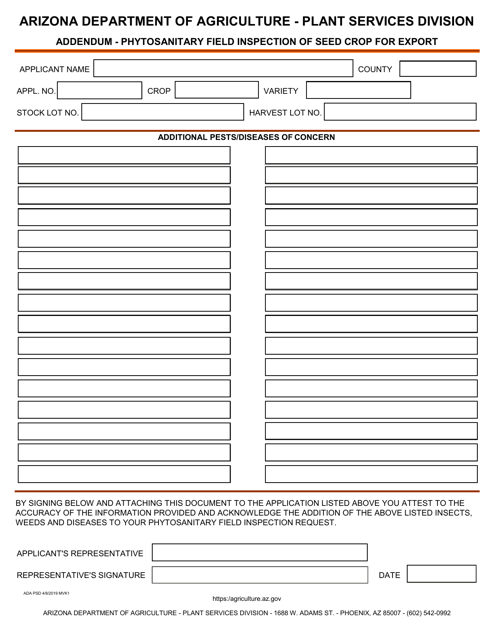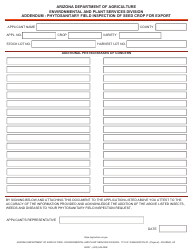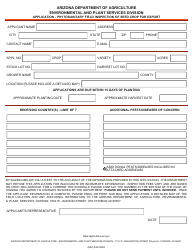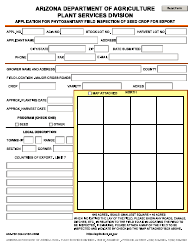Phytosanitary Field Inspection of Seed Crop for Export - Arizona
Phytosanitary Field Inspection of Seed Crop for Export is a legal document that was released by the Arizona Department of Agriculture - a government authority operating within Arizona.
FAQ
Q: What is a phytosanitary field inspection?
A: A phytosanitary field inspection is a process to assess the health and quality of seed crops for export.
Q: Why is a phytosanitary field inspection necessary for seed crops?
A: A phytosanitary field inspection is necessary to ensure that the seed crops meet international standards and are free from pests and diseases that could be harmful to other countries.
Q: Who conducts the phytosanitary field inspection?
A: The phytosanitary field inspection is conducted by authorized inspectors or plant health officials.
Q: What is the purpose of exporting seed crops?
A: The purpose of exporting seed crops is to provide high-quality seeds to other countries for agricultural purposes.
Q: What happens if a seed crop fails the phytosanitary field inspection?
A: If a seed crop fails the phytosanitary field inspection, it may not be eligible for export or may require additional treatments or certifications.
Q: Are there any fees associated with the phytosanitary field inspection?
A: Yes, there may be fees associated with the phytosanitary field inspection. The specific fees can vary.
Q: Is a phytosanitary field inspection required for all seed crop exports?
A: A phytosanitary field inspection may be required for seed crop exports, depending on the regulations of the destination country.
Q: Can a phytosanitary field inspection be conducted in other states?
A: Yes, phytosanitary field inspections can be conducted in other states as well, depending on the requirements of the exporting country.
Q: What are some potential pests and diseases that a phytosanitary field inspection looks for?
A: A phytosanitary field inspection looks for pests and diseases such as insects, fungi, bacteria, and viruses.
Form Details:
- Released on April 8, 2019;
- The latest edition currently provided by the Arizona Department of Agriculture;
- Ready to use and print;
- Easy to customize;
- Compatible with most PDF-viewing applications;
- Fill out the form in our online filing application.
Download a fillable version of the form by clicking the link below or browse more documents and templates provided by the Arizona Department of Agriculture.




